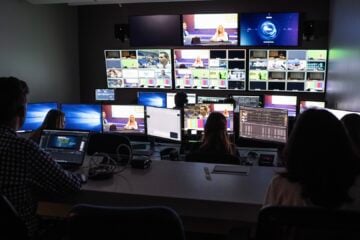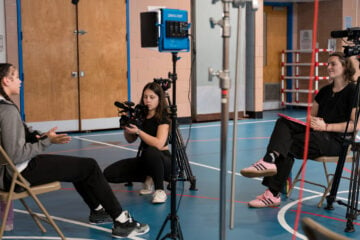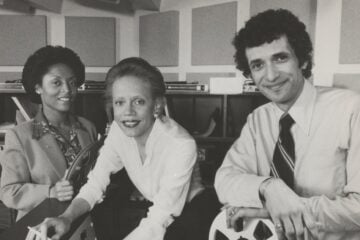At PRPD, NPR’s Oreskes talks details of journalism hubs with stations

Rich Orris / PRPD
Michael Oreskes speaks at the Public Radio Program Directors conference in August 2017.
WASHINGTON — NPR SVP of News Michael Oreskes told public radio station leaders Wednesday that a proposed system of journalism hubs will boost not just the network’s coverage but reporting at stations as well.
“Most of what we are going to end up improving will be our local coverage or our regional coverage, which then will hopefully roll up to the really brilliant, insightful, informed national coverage,” Oreskes said during a session for news/talk stations at the Public Radio Program Directors conference.
NPR now has only four bureau chiefs working with more than 1,400 reporters at member stations to get stories on the network’s national programs. “God bless those four, they are amazing journalists, … but there’s no way this could be anything other than doing the best you can with an impossible wave of conversation and information washing over you,” Oreskes said.
NPR has increased reporting partnerships with member stations in recent years. Oreskes now wants to take those efforts to a new level with a “bigger and more robust” network of journalism hubs, one pillar of an NPR compact with stations announced in February. The system could entail 10 to 15 editors working with station journalists across the country, Oreskes said.
The concept is still in early stages — “This is a philosophy, … not yet a detailed plan,” Oreskes said. But NPR expects to conduct several pilots over the next year or two and share results with the system.
Session moderator Ben Adler, capitol bureau chief at Capital Public Radio in Sacramento, Calif., asked Oreskes what he would tell station leaders who might be skeptical of the hubs.
“The hubs are about strengthening the journalistic newsgathering capacity in each of the regions that they operate,” Oreskes said. “That will probably be of a much greater benefit to addressing each station’s challenges than it will end up being to the national audience.”
But Oreskes added that NPR will need “to demonstrate that there’s both revenue and audience opportunity in working more closely together. … The first test for us will be our ability to show that we can actually put the money together to launch these hubs.”
The CPB-funded Local and Regional Journalism Centers will be “a brilliant base upon which we can now build,” he said, though he added that not all of the centers will necessarily “fit perfectly into where we need to go.”
Sam Fleming, director of news and programming at WBUR in Boston, asked Oreskes what NPR is thinking regarding the challenge of achieving “a playing field with standards that fit the NPR standards” while understanding that resources vary among stations.
No decisions have been made about such standards, Oreskes said. “It isn’t for NPR to dictate,” he said. “It’s for us to figure out.” NPR is planning to arrange discussions between station journalists and a team of network representatives about newsroom independence, rules for newsgathering and other issues, Oreskes said. The network’s team consists of Mark Memmott, supervising senior editor for standards and practices; Keith Woods, VP of newsroom training and diversity; and Tamar Charney, managing editor of NPR One.
Kathy Merritt, who recently rejoined CPB as its SVP for journalism and radio, told the group that in the early ’80s, she was part of a Public Radio News Directors Inc. group that met with NPR to say stations “really know how to do stuff, and you should trust us. So it’s kind of gratifying … to see that after all these years, we have leadership at NPR who is finally saying, ‘Well yeah, stations, you’ve got something going on.’”
But session attendees also said stations have work to do. Adler cited “some baggage in terms of issues of trust and rivalries” throughout the system.
“In order to meet what our audience wants from us today, I think we have to collectively decide we’re going to set that aside and we’re going to have a fresh start,” he said.
Such issues shouldn’t delay more collaboration, said Zoe Clark, PD at Michigan Radio. “I would hope that this happens sooner rather than later,” she said. “… [W]e can’t base all of these conversations with one another about things that have happened in previous years.”






